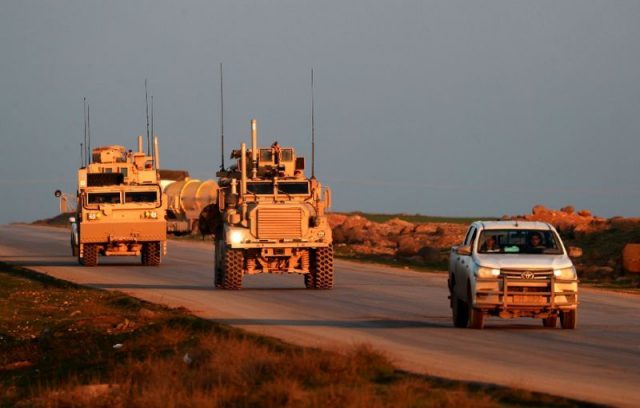AFP |
France on Tuesday opened the door to repatriating more than a hundred jihadists being held in Syria, in a marked change in stance brought about by the planned withdrawal of US troops from the country. Paris is worried that French prisoners held by the Kurdish-led Syrian Democratic Forces (SDF) could be released or escape after US President Donald Trump announced plans last month to pull American forces out of Syria.
Until now, French officials had insisted the fighters and their wives must be prosecuted and jailed locally while offering to take back the children of jihadists and place them with relatives in France. “Given the development of the military situation in northeast Syria, the American decisions, and to ensure the security of the French people, we are examining all options to avoid the escape and scattering of these potentially dangerous individuals,” the French foreign ministry said in a statement.
A French security source, speaking on condition of anonymity, told AFP that 130 people could be repatriated, confirming a figure reported by the BFM news channel, which said the group included men and women.
“If the forces who are guarding the French fighters took the decision to expel them to France they would be immediately placed in the hands of the law,” it added. Making clear that the jihadists many of whom enlisted with Islamic State would face the full weight of the law, the ministry added: “These people voluntarily joined a terrorist organization which is fighting in the Levant, carried out attacks in France and continues to threaten us.”
Speaking on the BFM news channel earlier Tuesday, Interior Minister Christophe Castaner linked the decision to the US withdrawal. “The Americans are pulling out of Syria. There are currently people in prison (in a Kurdish-controlled part of Syria), who are being held because the Americans are there and who will be freed,” he said.
Read more: Syria regime and rebels swap prisoners, Turkey says
A French security source, speaking on condition of anonymity, told AFP that 130 people could be repatriated, confirming a figure reported by the BFM news channel, which said the group included men and women. A second French official, also speaking on condition of anonymity to AFP, said the group included 70 to 80 children being held with their mothers. The French foreign ministry said in its statement that it could “in no way confirm” the figure of 130.
Returnee Attack Threat
The French government has for years been grappling with what to do with citizens suspected of having fought alongside IS or other extremist groups in Syria or Iraq. Up to 1,700 French nationals are thought to have traveled to Iraq and Syria to fight with the jihadists between 2014 and 2018, according to government figures. Some 300 are believed to have died in combat.
Under another scenario outlined by French officials that Paris is desperate to avoid, the Kurds could seek protection from Syrian President Bashar al-Assad, who could then use the French prisoners as bargaining chips with Paris.
By September 2018, around 260 had returned home of their own accord, with nearly 200 prosecuted, according to the justice ministry. “These are French people before being jihadists,” Castaner said while denying the government was softening its position. “It’s not a question of being taken back. If they come to France they will be incarcerated,” he said.
His remarks about the prisoners being French citizens first and foremost drew an indignant response from the far-right National Rally (RN). “Non, @CCastaner!” RN leader Marine Le Pen tweeted. “These are jihadists, they should therefore no longer be French.”
Valerie Boyer, an MP for the rightwing Republicans, said she was “shocked” by the idea of jihadists being allowed return home. “We’re looking after the welfare of the executioners. I’d rather we looked after their victims,” she told BFM, calling for those responsible for “the worst crimes possible” to be stripped of their citizenship.
Read more: Syrian army deploys to Manbij in new alliance with Kurds
Trump shocked America’s allies in December by announcing that the US, which heads up a coalition that has been carrying out airstrikes against IS since 2014, would withdraw its 2,000 remaining troops from Syria on the grounds that the jihadists had been “largely defeated”.
The announcement came as a blow particularly to the Kurdish-led SDF forces which have spearheaded the fight against IS on the ground. The SDF is dominated by the Kurdish YPG militia, which is considered a terrorist organization by Turkey, which is threatening to attack the group.
France fears that if the Kurdish forces are drawn into battle with Turkey in northeast Syria, the foreign jihadists being held there could escape or be freed. That would pose a significant threat for France, where jihadists have been involved in a number of deadly attacks since 2015, including the Paris attacks of November 2015 in which 130 people were killed.
Read more: Captured Irish jihadist tells of dying days of ‘caliphate’
Under another scenario outlined by French officials that Paris is desperate to avoid, the Kurds could seek protection from Syrian President Bashar al-Assad, who could then use the French prisoners as bargaining chips with Paris.
© Agence France-Presse














